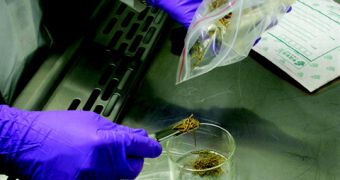Common knowledge has it that in the past, hemp, cannabis or marijuana were cultivated or used in their wild-grown form for purposes like making rope, clothes or other similar items. But a recent discovery of a tomb in the Gobi desert, dating about 2,700 years ago, indicates that this theory may be wrong. The tomb, located in Yanghai Tombs close to the Turfan prefecture in China, contained the remains of a blue-eyed man who was apparently buried with a number of possessions, among which was almost a kilogram (about two pounds) of marijuana.
Initially, the experts thought the plant was something like a coriander, but the subsequent genetic and botanical analyses indicated that it was clearly marijuana, and that it definitely had powerful psychoactive properties (it could get people high). As the lead author of the research, Ethan Russo, a visiting professor at the Chinese Academy of Sciences Institute of Botany, explained for the Discovery News, the plant "is quite similar" to the one cultivated nowadays.
"We know from both the chemical analysis and genetics that it could produce THC [tetrahydrocannabinolic acid synthase, the main psychoactive chemical in the plant]," shared Russo, but its effects were lost due to its decomposition through the ages. The 45-year-old Caucasian "individual was buried with an unusual number of high value, rare items," he stated, adding that he might have been a Gushi shaman.
The seeds’ color and size, as well as their mixing with leaves indicate that they were clearly cultivated, while the fact that the male parts, which are less psychoactive, had been previously removed from the stash leaves little doubt to the purpose of the plant. The thing that the scientists need to solve is how they were consumed, since no specific device for this activity has been found. "Perhaps it was ingested orally," suggested Russo. "It might also have been fumigated, as the Scythian tribes to the north did subsequently."

 14 DAY TRIAL //
14 DAY TRIAL //